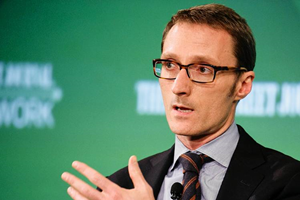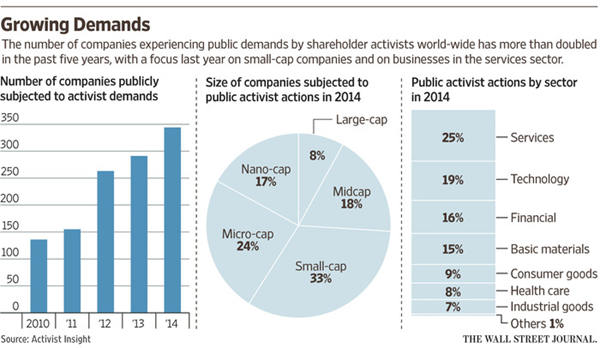|
THE
WALL STREET JOURNAL.
Business
|
Journal
Reports: Leadership
Charles Penner Makes the Case for Shareholder Activism
JANA executive on the successes and what some consider to be the
excesses
|
|
Charles Penner discusses how shareholder activists draw their
power. Photo: Paul Morse |
June 21, 2015 11:19 p.m. ET
Shareholder activists have
an ally in Charles Penner, a partner and chief legal officer at JANA
Partners, an investment firm with $11 billion in assets under
management, and a record of supporting activist campaigns. The Wall
Street Journal’s Dennis Berman spoke with Mr. Penner about shareholder
activism, its successes, and what some might consider its excesses.
Edited excerpts of their
conversation follow.
MR. BERMAN: So the letter
comes in to the board or the CEO. The CFO is probably immediately
brought in. What’s your advice about what they should do when the
activist shows up?
MR. PENNER:
My advice, and I think most shareholders’ advice, is to engage. If you
look at the campaigns where we’ve had an easy time of it, it’s where
companies take it for granted that they can stiff-arm us and not
engage in debate.
It obviously doesn’t make
the analyst and the proxy advisory firms happy. But if you look at it
and say, “Look, we’ve got a good argument here and these guys are
wrong and we can show them that they’re wrong,” we’re the type of firm
that will listen to that and respond.
MR. BERMAN: What
percentage of situations would you say that you’ve presented your
detailed analysis, the management comes back and you say, “Oh, you
know what? They’re right?”
MR. PENNER:
It’s statistically insignificant. But it could happen. Look, we don’t
throw stuff against the wall and see if it sticks. So by the time
we’re sitting down with you, I think that it’s unlikely we’re going to
be 100% wrong.
Misuse
of assets
MR. BERMAN: If there is a
bigger macro criticism, it is that activism is pushing for more
shareholder returns largely through dividends or buybacks. The Journal
did a recent analysis that showed that U.S. companies are now putting
more into buybacks and dividends than into capital spending. Long
term, the theory goes, that is dangerous to U.S. competitiveness and
corporate- level competitiveness.
|

CHARLES PENNER | ‘I don’t think bad
ideas are the sole provenance of shareholders.’
Photo: Paul Morse/Dow Jones
|
|
MR. PENNER:
I don’t think anyone is arguing for irresponsible returns of capital.
The Economist also did a study of the 50 biggest activist campaigns in
the U.S., the most recent ones. They found that not only did
profitability go up and better returns for shareholders, but capital
investment [and] R&D went up. So there is a bigger picture here.
But just speaking for us
personally, we’ve never in my opinion advocated for an irresponsible
return of capital. You have to have a stock that’s undervalued and a
clear plan to correct that undervaluation. And you need to have a
situation where there’s not any higher and better use of capital.
Companies who have been
under pressure to return more capital than they thought was
responsible, like Apple and Amgen, had reputations as being
responsible toward capital. They weren’t just hoarding cash for no
reason. And they were able to fight back. So I see your point. I’m
sure that there are irresponsible returns of capital. I think, though,
to lay it all at the feet of activists is going a little far.
A rose
garden?
MR. BERMAN: It sounds from
your point of view as if activism is a rose garden. Obviously it isn’t
that simple. If you had to, what sort of letter would you write to the
activism community about how they’re doing things wrong?
MR. PENNER:
Well, I’m trying to get out of the premise since I don’t agree with
it. I mean, I’m going to say two things. One: Shareholder democracy is
like every other form of democracy; it’s the worst form of government
we have except for all the other ones. It won’t always be perfect.
People will have bad ideas. I don’t think bad ideas are the sole
provenance of shareholders.
I would say, though, to
the activist community, that people are watching. We have a very good
track record over the, say, 10 to 15 years since activism has really
been going on. If we start proposing things that are irresponsible or
if people start pointing to situations we’ve been involved with and
saying, “Well, look, there is a company that they took and dragged
down,” the BlackRocks and the T. Rowe’s and the Vanguards will quickly
withdraw their support. We obviously have to be cognizant.
MR. BERMAN: One can make
the argument that shareholder activism is driven mainly by the big
institutional money managers who’ve thrown in their lot with you
because they are getting pressured from ETFs and need to show some
returns.
MR. PENNER:
Sort of. We’re basically a market-driven mechanism to address
underperformance at certain companies. The mechanism is you take a
small stake in a company and bring about the change that used to
happen privately. The gatekeepers are the big institutions seeking
returns. Without their support, we would shrivel up and die. But it’s
a free-market response to a problem, which is that it doesn’t make
sense for most shareholders to spend the time and the money and the
headline risk to do this.
|

